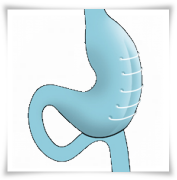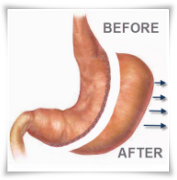Qualify for Gastric Sleeve Surgery
To be able to qualify for gastric sleeve surgery, there are a few requirements that you must meet.
Bariatric surgeons will not perform a gastric sleeve procedure on a patient who does not meet the requirements because it can pose health risks for those that do not qualify for gastric sleeve surgery.
However, it is much easier to qualify for gastric sleeve surgery compared to a gastric bypass because the gastric sleeve is much less invasive, hence, less risks are involved. Nonetheless, there are a few criteria that patients must meed in order to qualify for gastric sleeve surgery.
Click here to read more about the Gastric Sleeve.
If you do qualify for gastric sleeve surgery, you can significantly reduce your weight, and eliminate up to 80% of that excess fat within 2 years.
Qualify for Gastric Sleeve Surgery – A General Guideline
Here is a general guideline of who can qualify for gastric sleeve surgery:
- Individuals that are morbidly obese, obese or extremely overweight
- Your BMI (Body Mass Index) must be 35 or higher
- You must be 100 lbs heavier than your ideal body weight
- You may be less than 100 lbs heavier than your ideal body weight, but you must suffer from health problems caused by being overweight
- You are overweight but do not qualify for riskier bariatric surgeries
- You must understand the procedure and be 100% committed to a permanent lifestyle change
Who Can Qualify For Gastric Sleeve Surgery?
To qualify for gastric sleeve surgery, first, you must be obese, or extremely overweight. This simply means that your current BMI must be 35 or greater. You may also qualify for gastric sleeve surgery if you have a BMI that is slightly lower than 35, but you must be 100 lbs more than your ideal body weight.
In some cases, there are patients that are less than 100 lbs overweight, or have a BMI that is less than 35, however they suffer from considerable health problems that are brought on by carrying the excess weight which allows them to qualify for gastric sleeve surgery. These issues can include type 2 diabetes, sleep apnea, arthritis, and shortness of breath among others.
 A lot of people who have been diagnosed as severely obese are very good candidates to undergo the gastric sleeve treatment as long as they understand the procedure; they don’t have a serious pathological eating disorder and are agreeable to return to their bariatric surgeon for follow ups.
A lot of people who have been diagnosed as severely obese are very good candidates to undergo the gastric sleeve treatment as long as they understand the procedure; they don’t have a serious pathological eating disorder and are agreeable to return to their bariatric surgeon for follow ups.
The gastric sleeve surgery can be used on its own as a treatment, or it can be the initial step to a second procedure. Individuals who are morbidly obese will qualify for gastric sleeve surgery, but may not qualify for more invasive procedures like the Roux-en Y or the biliopancreatic diversion. Those who are severely obese are at a much higher risk of complications, and a responsible bariatric surgeon will not perform a high risk procedure on a patient.
For patients that have a BMI of more than 50, the gastric sleeve is often times used as the initial step to manage the weight before moving towards the more complex procedure like the duodenal switch or the gastric bypass surgery. These two types of procedure can be done with patients ranging from 12 to 79 years of age.
That patient must first bring their weight down to an acceptable level, a level where the more invasive surgery will pose much less risk. They may not qualify for a gastric bypass, but they will be able to qualify for gastric sleeve surgery. They get the gastric sleeve, lose some excess weight, and can then qualify for the gastric bypass. The gastric sleeve can be used as a stepping stone for those morbidly obese individuals to attain their ideal body weight.
There are also some people who have the BMI of 40 or higher, or 100 lbs more than the ideal weight, but they can still qualify for gastric sleeve surgery as long as the surgeon deems they are not at a high risk, and that the patient is committed to a lifestyle change.
A person who has a BMI of 35 to 39 and suffers from issues linked to their weight can also qualify for gastric sleeve surgery. These health problems can include high cholesterol, type 2 diabetes and high blood pressure.
As a stand-alone procedure, the gastric sleeve has by far been the most remarkable because it is not expensive and has minimal complications compared to the other types of bariatric surgery. Plus, the gastric sleeve offers the same weight loss effect, and is closely comparable to target the problems associated with obesity.
The gastric sleeve can be the first step to a healthier life, but if you want to qualify for gastric sleeve surgery, you must be committed to change. The gastric sleeve is not a quick fix, it reduces your food intake permanently, and the weight is lost over a one to two year period. You must adjust your eating habits accordingly, and follow the advice of your bariatric surgeon to ensure an effective and safe weight loss. Speak with your doctor, or consult a bariatric surgeon to find out if you qualify for gastric sleeve surgery.

